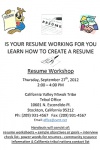CVMT Hosts “Resume Workshop” for Native American Community
The California Valley Miwok Tribe hosted a resume workshop to assist participants in learning how to create a resume. The workshop consisted of resume worksheets, sample objectives and goals, interview checklists, power words for resumes; community resource information and California Tribal Nations contact lists.
The major purpose of the resume is to get a job interview. Unlike the application, the resume is designed by you to highlight your strongest points. The job seeker can also send the resume to a broader range of potential employers, and thus expand their job search. Even when applying for trade and hourly positions, a short resume can give the job seeker a competitive advantage. Before writing a resume, the job seeker needs to choose an appropriate format. Format refers to the type of information you (the job seeker) have included about yourself, and the order in which it appears.
There are three basic resume formats: chronological, functional and a combination of the two.
Chronological Resume: The chronological resume lists your recent job at the top of the page, then continues down to your earliest job. Chronological resumes can range from a simple career summary to a more elaborate description of work responsibilities. This format is effective when you have a continuous employment history and your past experiences relate directly to the positions for which you are applying.
Functional Resume: The functional format highlights your skills and accomplishments rather than your work history. It lists things you’re good at and things you’ve accomplished at the top of the page, then summarizes the jobs you’ve held at the end. The functional format is effective when you are switching fields or industries.
Combination Resume: The combination resume uses aspects of both the chronological and functional formats. It lists your jobs from recent to earliest, then highlights responsibilities and accomplishments within each job listed. This combination approach is effective when you have held several jobs with significant responsibilities and accomplishments.
When writing a resume, remember “the major purpose of the resume is to get a job interview”. Tailor your objective or goal to the employer’s needs. Show how your experience, ability, or skill could help the employer solve his problems.
The California Valley Miwok Tribe handed out Certificates of Completion to the participants who attended the two-hour Resume Workshop. Besides learning how to create a resume, participants received hand-outs with information regarding website addresses for Employment Services, Employment Agencies contact lists; List of Community Resources; Tribal Casino Locations, and a Department of the Interior – Bureau of Indian Affairs – Tribal Leaders Contact List for federally recognized tribes in the State of California.
Thanks to all who attended and good luck!


